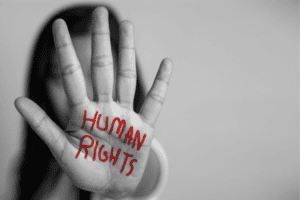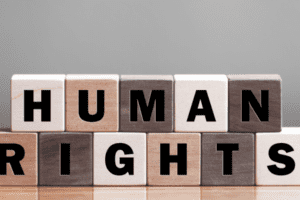INTRODUCTION

Meaning of Human Rights
1. Natural freedoms inborn to all people: Human Rights are innate to each individual essentially by goodness of their reality. They are not conceded by any administration, association, or authority; rather, they are a basic piece of being human. Unavoidable privileges can’t be removed or relinquished, no matter what a singular’s experience, character, or conditions.
2. Security from separation and misuse: Basic freedoms act as a safeguard against different types of segregation, misuse, and infringement of an individual’s pride. They envelop a wide scope of privileges that expect to shield people from bad form, guaranteeing that they are dealt with reasonably and with deference. Segregation in view of variables like race, orientation, religion, or ethnicity is in opposition to the standards of common liberties.
B. Significance of Common rights
1. Major to human rights: Common freedoms are inherently connected to the idea of human right. They attest the intrinsic worth and worth of each and every person, regardless of their social or financial status. These privileges ensure that all individuals reserve the option to be treated with deference, to live liberated from abuse, and to lead lives of poise and satisfaction.
2. Building blocks for just and impartial social orders: Common freedoms give the central standards whereupon just and evenhanded social orders are constructed. They are the foundations of law and order, equity, and social congruity. At the point when basic liberties are regarded and maintained, social orders will generally be more quiet, prosperous, and comprehensive, helping every one of their individuals.
Human Rights with their center standards of inherent nature and insurance from separation and misuse, stand as a guide of equity, nobility, and uniformity for individuals across the world. They are fundamental for making a fair, compassionate, and flourishing worldwide local area.
The General Statement of Human Rights (1948)

1. Creation and reception by the Assembled Countries: The General Statement of Human Rights (UDHR) was made and taken on by the Unified Countries on December 10, 1948.
A memorable report arose in the repercussions of The Second Great War as a reaction to the barbarities and far and wide common freedoms infringement committed during the conflict.
The UDHR was drafted fully intent on laying out a general arrangement of standards to shield the privileges and pride, everything being equal, no matter what their ethnicity, race, or belief.
2. Spearheading report for global Human Rights: The UDHR is in many cases viewed as a spearheading and milestone record in the field of worldwide basic freedoms. It established the groundwork for the improvement of a thorough and generally material system of basic freedoms.
The statement includes an expansive scope of common, political, monetary, social, and social privileges, making it a foundation for resulting global basic freedoms deals and shows.
B. Advancement of Basic liberties Ideas
1. Advancement over hundreds of years: The idea of basic liberties has developed over hundreds of years and across various societies and legitimate customs.
It draws upon a rich history of philosophical, strict, and lawful customs that have added to the comprehension of individual privileges and opportunities.
The improvement of basic liberties is definitely not a new peculiarity; it has establishes in different verifiable periods, including old civic establishments, the Edification time, and civil rights developments.
2. Impact of Illumination reasoning: The Edification time, which spread over the seventeenth and eighteenth hundreds of years, affected forming current ideas of common freedoms.
Scholars of the Illumination, like John Locke and Jean-Jacques Rousseau, stressed the normal privileges and freedoms of people.
These thoughts fundamentally added to the development of the idea that all individuals are qualified for specific privileges and insurances, no matter what their social or political status.
The General Statement of Common freedoms and the improvement of basic liberties ideas are interconnected and together address a defining moment in mankind’s set of experiences.
They mirror a guarantee to perceiving and maintaining the inborn nobility and worth of each and every person, and they keep on molding the manner in which social orders and countries address issues of equity, correspondence, and human prosperity.
Common and Political Privileges
1. Right to life and freedom: Common and political privileges incorporate the central privileges to life and freedom.
This implies that each individual has the intrinsic right to life, security from erratic hardship of life, and the opportunity to live without outlandish impedance or danger to one’s very own freedom.

2. The right to speak freely of discourse and religion: Common and political privileges likewise incorporate the right to the right to speak freely of discourse and religion. This implies that people have the opportunity to offer their viewpoints and sentiments without control or discipline.
Furthermore, they reserve the option to rehearse their religion and convictions without mistreatment, guaranteeing a different and lenient society.
B. Monetary, Social, and Social Privileges
1. Right to work and schooling: Financial, social, and social freedoms center around the prosperity and advancement of people. This classification incorporates the option to work, and that implies that everybody has the privilege to look for business and appreciate good states of work, including fair wages and safe work spaces. Additionally, the right to schooling guarantees that all people approach quality instruction, no matter what their experience or financial status.
2. Way of life and wellbeing: Financial, social, and social freedoms likewise incorporate the right to a satisfactory way of life, which incorporates admittance to food, attire, and lodging. Moreover, the right to wellbeing implies that people reserve the option to the most elevated achievable norm of physical and psychological well-being, including admittance to medical care administrations, sterilization, and nourishment.
C. Aggregate Freedoms
1. Freedoms of native people groups: Aggregate privileges are privileges that relate to gatherings or networks. The freedoms of native people groups are an illustration of aggregate privileges, and they underline the assurance of native societies, customs, and grounds. These privileges expect to guarantee the protection of native lifestyles and self-personality.
2. Self-assurance: Self-assurance is one more aggregate right that permits networks and countries to decide their political status, grow financially, and lay out their own types of government. It is frequently connected with decolonization and the right of countries to pick their own fates.
These various classifications of basic liberties cooperate to give a thorough system to defending the respect, opportunity, and prosperity of all people and networks. They address many viewpoints in human existence, from individual freedoms to social and financial security, guaranteeing an all the more and fair society.
Joined Countries Shows and Deals
1. ICCPR, ICESCR, CEDAW, and so forth: The Unified Countries has laid out a wide cluster of shows and deals that cover different parts of common freedoms. A few prominent models remember the Worldwide Pledge for Common and Political Privileges (ICCPR), the Global Contract on Financial, Social, and Social Freedoms (ICESCR), and the Show on the End of All Types of Oppression Ladies (CEDAW), among numerous others. These peaceful accords frame explicit freedoms and commitments that part states should stick to safeguard and advance common liberties. They cover regions, for example, the right to life, the right to speak freely of discourse, the option to work, and the end of oppression ladies.
2. Responsibilities by part states: When nations become signatories to these Unified Countries shows and settlements, they focus on maintaining the guidelines and standards illustrated in these arrangements. Part states are supposed to take authoritative, managerial, and different measures to guarantee that the freedoms listed in these archives are safeguarded and regarded inside their separate domains. They additionally submit customary reports on their advancement in executing these freedoms.
B. Provincial Basic freedoms Arrangements
1. European Show on Basic freedoms: Provincial associations have additionally settled their own common liberties arrangements. The European Show on Common liberties is a prominent model, covering European nations and stressing the insurance of individual privileges, including the right to life, independence from torment, and the right to a fair preliminary. This show laid out the European Court of Common liberties, which permits people to bring protests of basic freedoms infringement against their own states.
2. African Contract on Human and People groups’ Privileges: The African Sanction on Human and People groups’ Freedoms is another critical local basic liberties arrangement. It centers around individual privileges as well as perceives the freedoms of networks and people groups. It envelops common and political freedoms, financial, social, and social privileges, and the privileges of native people groups in Africa.
These worldwide and territorial common liberties instruments assume a basic part in guaranteeing that common liberties are safeguarded at both the worldwide and local levels. They give a legitimate structure to part states to lay out and implement strategies and regulations that maintain basic liberties norms, advancing an additional fair and impartial world.
Forms of Human Rights Violations
Torment: This includes incurring extreme physical or mental agony for people, frequently with the purpose of removing data, discipline, or terrorizing. Torment is generally censured as a gross infringement of basic liberties.
Segregation: Separation alludes to treating people unreasonably or inconsistent in light of their race, orientation, religion, ethnicity, or different attributes. It denies individuals of equivalent open doors and insurance under the law.
Erratic detainment: Erratic confinement happens when people are held in guardianship without legitimate lawful strategies, without a legitimate explanation, or past a sensible time. It disregards the right to freedom and a fair preliminary.
Decimation, atrocities, illegal exploitation:
Slaughter: Destruction is the purposeful and methodical eradication of a specific ethnic, racial, or strict gathering. It is the gravest unspeakable atrocity, including mass killings, constrained removals, and different types of obliteration.
Atrocities: Atrocities incorporate demonstrations carried out during furnished clashes that abuse global helpful regulation, for example, focusing on regular people, going after clinics, or utilizing denied weapons. They can prompt indictment by worldwide courts.
Illegal exploitation: Illegal exploitation includes the enrollment, transportation, or holding onto of people through power, misrepresentation, or intimidation for double-dealing purposes, like constrained work or sexual subjection. It’s a significant infringement of individual flexibility.
B. Instances of Basic liberties Infringement
Holocaust, Politically-sanctioned racial segregation, Rohingya emergency:
Holocaust: The Holocaust is a lamentable illustration of destruction during The Second Great War, wherein a large number of Jews, alongside other minority gatherings, were deliberately killed by the Nazis.
It addresses quite possibly of the haziest section in mankind’s set of experiences.
Politically-sanctioned racial segregation: Politically-sanctioned racial segregation was an arrangement of regulated racial isolation and separation in South Africa from 1948 to the mid 1990s.
It denied dark South Africans equivalent privileges, admittance to assets, and political cooperation.
Rohingya emergency: The Rohingya emergency includes the oppression of the Rohingya Muslim minority in Myanmar, set apart by savagery, constrained relocation, and disavowal of citizenship.
It has brought about serious basic freedoms infringement and an exile emergency in adjoining nations.
Oversight, kid work, constrained work:
Oversight: Control is the concealment of data or articulation by states or different specialists.
It can limit the right to speak freely of discourse and admittance to data, sabotaging fundamental common liberties.
Youngster work: Kid work alludes to the work of youngsters in positions that are hurtful to their physical and mental turn of events. It denies them of their right to instruction and a protected youth.
Constrained work: Constrained work includes convincing people to neutralize their will. This training can include different structures, like obligation subjugation, illegal exploitation, or oppression, and abuses individual independence and opportunity.
Social Relativism

Fluctuation in common freedoms translation: Social relativism is the possibility that the understanding of basic liberties can change contingent upon social, verifiable, or provincial settings.
Pundits contend that various social orders might have changing viewpoints on what is common freedoms, and these distinctions can prompt difficulties in accomplishing a widespread comprehension of privileges.
For instance, a few societies might focus on aggregate freedoms over individual privileges.
Adjusting general qualities and social settings: A significant test lies in finding some kind of harmony between widespread common freedoms values and the social and context oriented variety of the world.
Social relativism can some of the time be utilized to legitimize denials of basic freedoms, making it important to figure out something worth agreeing on that regards social characters while maintaining crucial common liberties standards.
B. Sway versus Basic freedoms
Public sway as an obstruction: The standard of public power states that every country has the selective right to oversee its inside issues without outside impedance.
In any case, this can turn into a boundary to global mediation when denials of basic liberties happen inside a sovereign state.
Countries might be impervious to outer inclusion, in any event, when infringement are extreme, prompting a strain among power and the obligation to safeguard basic freedoms.
Obligation to Safeguard (R2P) standard: The Obligation to Secure (R2P) is a global standard that recognizes the obligation of the worldwide local area to mediate in instances of extreme common liberties infringement. Pundits contend that its execution can be quarrelsome, as it includes choices about when and how to mediate. Adjusting the power of countries with the need to safeguard basic liberties can challenge.
C. Execution Difficulties
Authorization in struggle zones: Executing basic liberties in struggle zones is especially difficult.
Outfitted clashes frequently bring about the breakdown of the rule of law, making it challenging to safeguard basic liberties, give helpful guide, and consider culprits responsible.
Peacekeeping endeavors can be intricate and require collaboration from fighting gatherings.
Asset limitations and political obstruction: Numerous countries, particularly in the creating scene, may come up short on assets and foundation to carry out basic liberties principles completely.
Political opposition can likewise present critical difficulties, as certain states might oppose executing freedoms that compromise their power or political interests.
These impediments can ruin the reasonable acknowledgment of basic liberties.
CONCLUSION
The Continuous Battle for Common liberties
Ceaseless development and transformation: The excursion to safeguard basic liberties resembles a waterway that continues to stream.
It’s continuously changing and adjusting to the difficulties of our reality.
Similarly as new advances and social issues arise, so do better approaches for protecting common liberties.
This implies that we’re continuously getting the hang of, developing, and tracking down better ways of guaranteeing everybody’s respect and prosperity.
Incomplete work in accomplishing widespread basic freedoms: Envision common liberties as a riddle, and we’re assembling every one of the pieces to make an existence where everybody is treated with reasonableness and regard.
Yet, there are still pieces missing, and we must track down them.
A few spots face a bigger number of difficulties than others, yet we want to ensure that nobody is forgotten about, and everybody’s privileges are secured.
B. The Significance of Maintaining Basic freedoms
Advancing harmony, equity, and uniformity: Consider common liberties the keys to an agreeable and fair world.
They assist us with building scaffolds of harmony, guarantee that the guidelines are fair for everybody, and make a reality where individuals are dealt with similarly.
At the point when we maintain basic freedoms, we’re similar to grounds-keepers watching out for a lovely, tranquil nursery where everybody can flourish.
A common worldwide obligation: We as a whole are in the same boat.
Very much like neighbors who post for one another, we, as a worldwide local area, share the obligation of safeguarding basic freedoms. It’s not only the occupation of one individual or one nation; it’s something we as a whole need to deal with.
It resembles ensuring everybody in our large worldwide family is protected, blissful, and free. We can all be superheroes in the battle for basic liberties!
1 thought on “” Battling for a World without Borders: The Human Rights Crusade 15+ reasons””

best article to read.